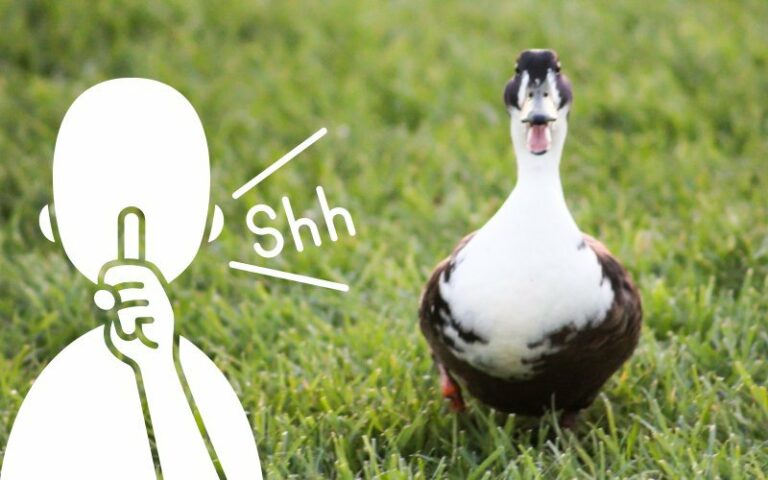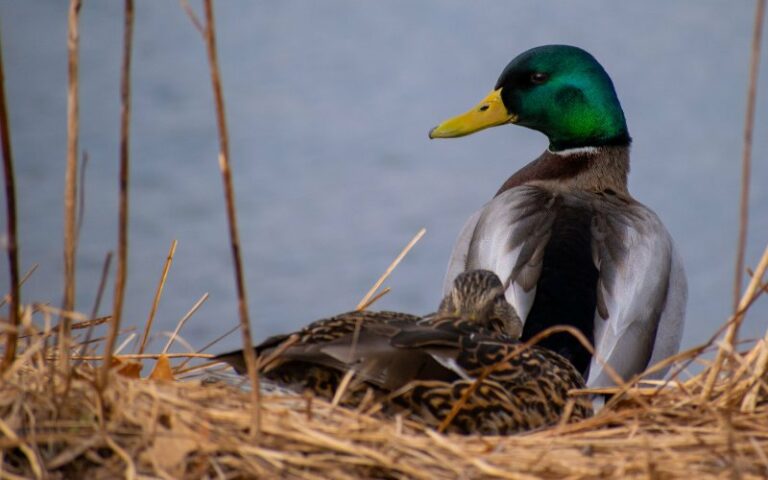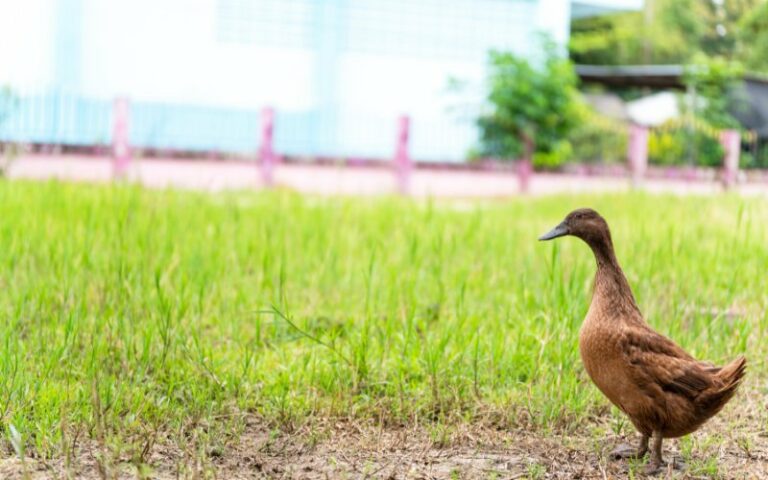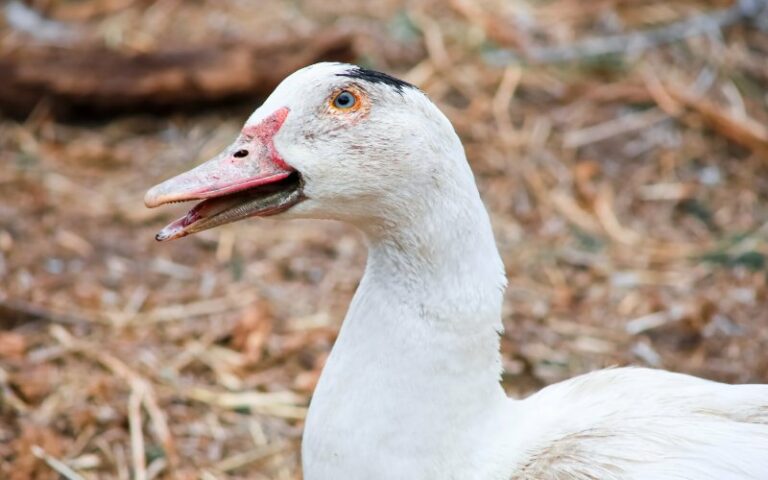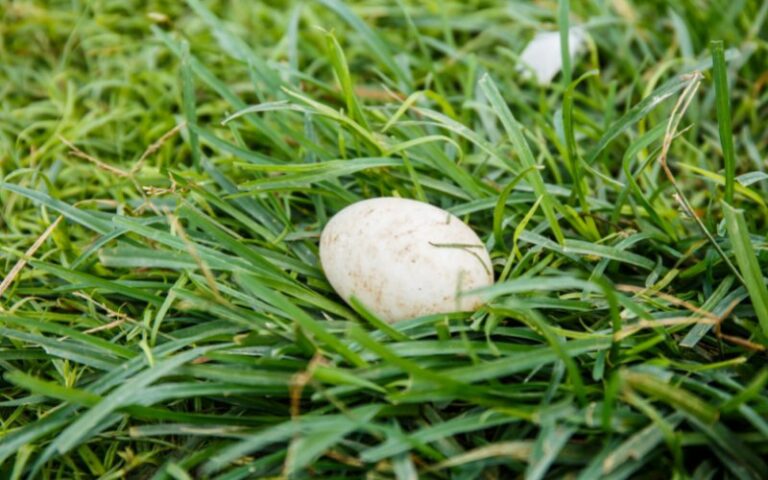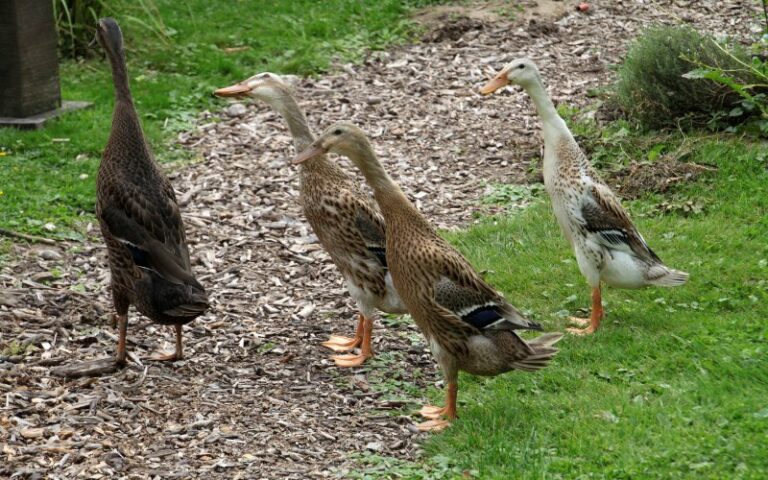Best Ground Cover for Duck Run (3 Suggestions)
Ducks are messy. This is true if you have a pair of bantam ducks or an entire egg-production flock. The ground cover or duck pen “flooring” you choose can have a big impact on the amount of work you have to do as well as the health and happiness of your ducks. It can be tempting, at first, to think a typical forage-type cover crop or typical ground cover, like clover or vetch, would do the trick. But the best ground cover for a duck run is something else entirely.
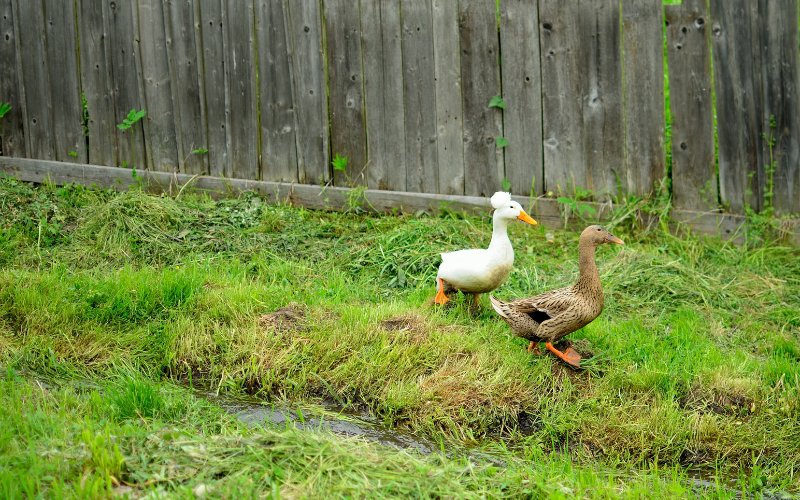
Best Ground Cover for a Duck Run? (The Short Answer)
If you’re looking for a ground cover for a duck run, your best bet is actually plain, tall grass. Choosing a variety of grass that grows fast, thick, and absorbs water quickly is ideal. You can combine this with other plantings like vines on the fences and a water-loving tree, or bush in the run, for the ideal solution.
What Works Well for Duck Pen “Flooring” in My Experience
The thing about ducks is that not only do they love deep water, but they also need it to regulate their body temperature and keep clean. However, this can present a problem for captive ducks as they tend to splash and “waste” water often.
Big Rocks, Small Rocks, and Pea Gravel
High quantities of splashed water and muck mean you either need an underground drainage system capable of handling it or a more gradual drainage field. The best way to accomplish this is to start with pea gravel.
This gravel can be placed around your water sources in a low circle or within a boundary. In my experience, a frame of landscape timbers can make a quick terrace for the pea gravel.
The swimming pool or bowl can be placed in the center of this pea gravel zone, with a few larger rocks used to help keep it in place and give your ducks some nice, smooth places to sit or stand.
The Field
Outside of this “splash area,” you should plant thick, low-growing plants with deep root systems such as buffalo grass or any pasture grass. Allowing this grass to grow up to its natural height instead of mowing it will also provide many benefits to your ducks.
Not only will the tall grass out-compete most seasonal weeds, but the longer it is, the more water it can take up. Ducks also feel more secure in tall grasses and can use the stems and seeds as forage.
Prevent Mud
Any trees or bushes that need a lot of water (such as willows or fruit producers) can also reduce the load of excess water and provide shade and forage at the same time when added to the duck run or duck pen. Tree and bush plantings can also help protect ducks from predators, particularly raptors.
Things to Think About When Selecting a Ground Cover For Your Duck Run
When selecting a ground cover for your duck run, you’ll want a long-term plan. Below are a few factors to consider before you commit.
Mud and Excess Water
When selecting a ground cover for your duck run, you’ll need to think about what to do with all that water, mud, and muck. Without something to absorb and disperse it, you’re going to end up with slippery mud that your ducks will dig little holes in and that will cause anything with shallow roots to slip out of place or be uprooted and eaten.
This is what will happen to anything sprout-based, clover or vetch, and anything shy of an established grass- particularly a pasture grass. Rhizome grasses and stolon-based grasses, like centipede grass, will not do well to help keep your duck run dry.
Hygiene
Still water breeds disease. While ducks, like pigs, seem like creatures that thrive in mud, they will need plenty of room to stretch out and keep their feet dry. Stagnant water and mud will lead to infections, as will standard slag or driveway gravel. If you must use gravel, only choose tumbled or pea gravel.
Growth Rate
The best ground cover for a duck run will need a fast growth rate. This will help it “heal” when your ducks use it for forage, rip it up by the root to get at a grub, or trample it underfoot to make a new nest. This damage and abuse should only make it more likely to take up the excess and abundant water in the run and shouldn’t damage the overall plant system at all.
Aesthetics
If you have a flock of ducks on a remote farm or out in a pasture, you may not care too much about how your duck pen looks. However, on a smaller educational or hobby farm or even in town, you may want your duck run to look nice as well as serve its intended purpose. This is where planting more than just a single ground cover comes in.
In addition to the low-growing pasture grass, you can work in plantings of taller grass such as pampas and other plants and vines. These will help absorb more water, reduce mud, and improve the forage and aesthetic score of the duck run overall.
Space
If all you have are a few bantam ducks in a 40′ x 40′ pen, you can get away with clover or another shallow-root ground cover. However, this is one of the only situations in which you can do so. Even as few as 5 medium-sized ducks in that same pen can turn that lush field of clover into a muddy pit in under a month.
Keep in mind how many ducks you have and how much foot traffic and foraging they can do before you commit to a lightweight but decorative ground cover, or you may be surprised at how quickly it disappears.
Forage
Ducks like to dig little holes all over their duck runs to forage for roots and bugs. You must choose a ground cover that produces a network of sod or nodes so that the damage from this behavior is minimized. Any plant that vines or branches off from a primary stem can easily be killed if a duck digs into its single taproot, for example.
Work and Waste
Until this point, the idea of deep litter or an inorganic ground cover has not been addressed. This is because these options, though acceptable to chickens, do not work for ducks.
Inorganic covers, such as fabric, tire tread, and concrete, often cause pools of stagnant water to form and lead to infection. If these pools can be prevented, sores are likely to develop in the ducks’ feet, also leading to infection. The ducks, with nowhere to forage and dig, may also become bored, stressed, or malnourished.
Deep litter, on the other hand, can work well for chickens as they fluff and scratch it up with their feet all day. This keeps it from becoming too hot and helps maintain a good microbial balance, with little mold and mildew.
Ducks do not do this. While they do dig holes, they tend to pack down dirt and litter with their flat feet. Their oils and need for water can also cause the deep litter to mildew quickly and this can lead to persistent lung problems over time unless the litter is turned and removed on an almost-daily basis.

